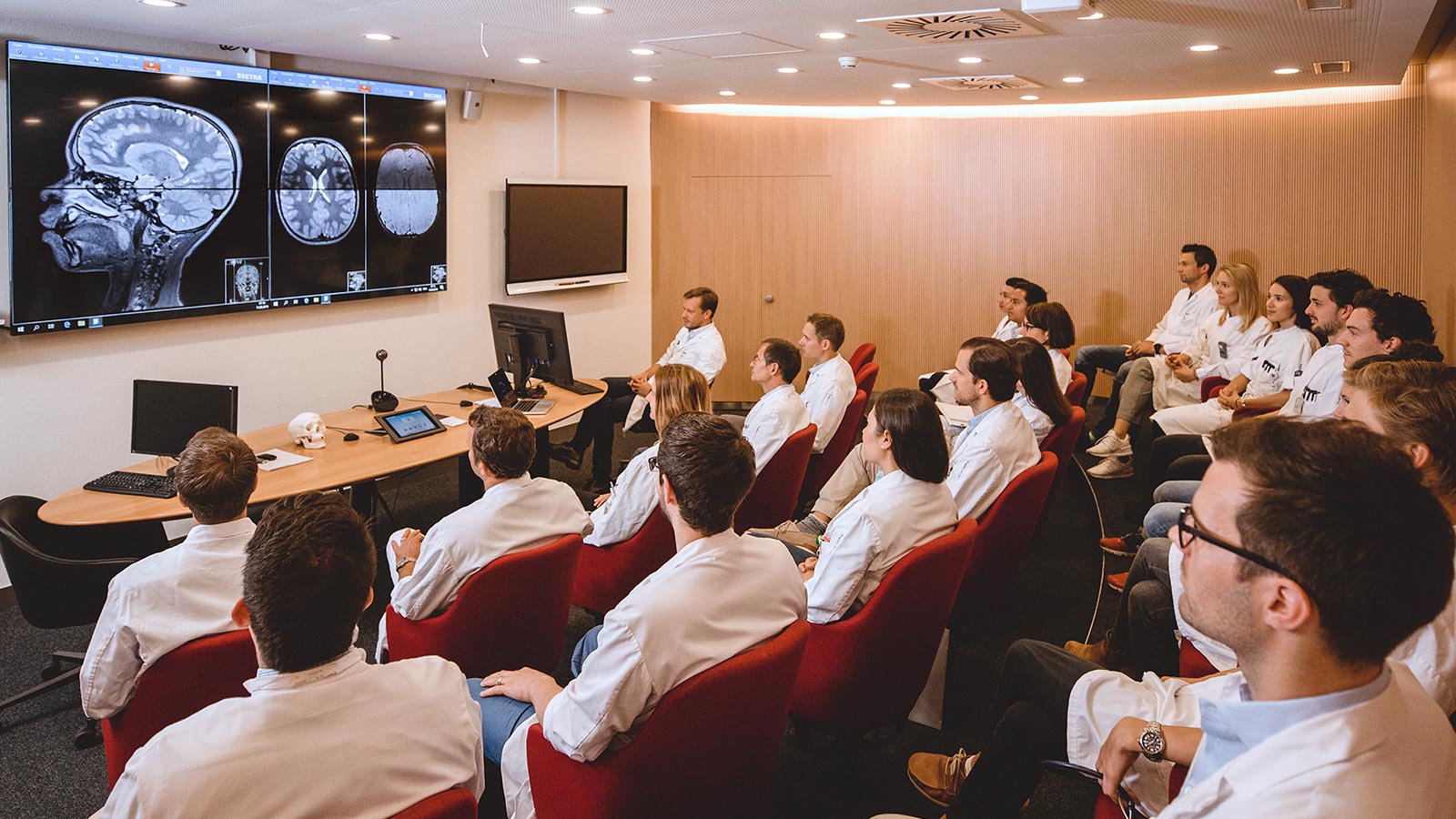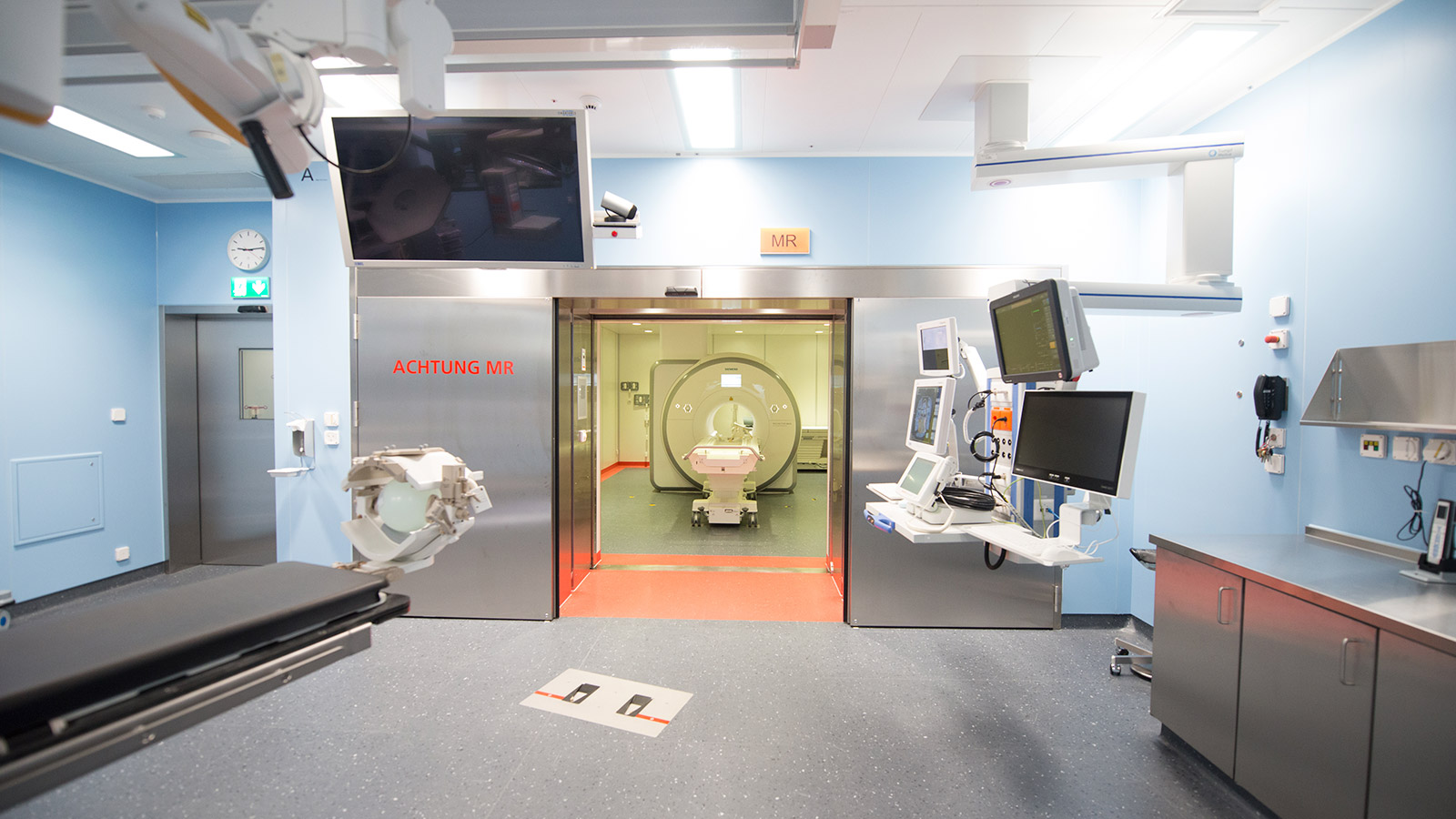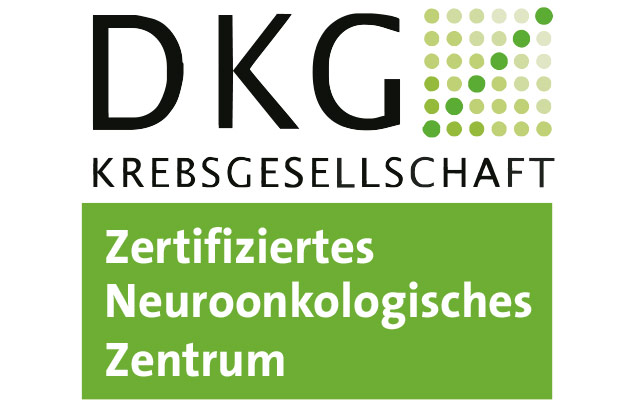The further development of our quality is a central concern of all employees of the Department of Neurosurgery. We are committed to offering our patients the best possible diagnostics and treatment. Our quality and safety management provides the optimal framework for this and is a guarantee for excellent work quality as well as the constant review and improvement of our work processes and services.
Our certification
Certification by an external body is an important guarantee of high treatment quality and patient safety in a hospital. It confirms that medical procedures, treatment standards, and safety measures are regularly reviewed and optimized in line with the latest scientific findings. For patients, this means they can trust that they will receive quality-assured care of the highest standard.
The Brain Tumor Center (Neuro-Oncology Center) of the Inselspital, under the direction of the Neurosurgery Department, has been certified according to the criteria of the German Cancer Society since 2016. The certification is regularly reviewed and renewed through internal and external audits. This is how we ensure that patients with brain tumors or brain metastases always receive the best treatment currently available – whether according to recognized guidelines and international standards or new alternative methods.
German Cancer Society certificate
Certification by the German Cancer Society (DKG) as a neuro-oncology center is intended to improve the care of oncological patients and guarantee a high standard of quality in oncological treatment.
Neuro-oncology center certificate (PDF) (German language)
Standardized processes
Standardized processes are crucial for the quality and safety of a clinic, as they create clear structures and processes that minimize sources of error and ensure a consistently high quality of treatment. They also enable reliable patient safety through consistent implementation of proven standards. These include preoperative checklists, an intraoperative time-out protocol, efficient handover protocols, and our own OPTIMISST tumor protocol.
Ombuds office
The ombuds office at the Inselspital is available to all patients and relatives of the Insel Gruppe as a neutral point of contact and mediation in the event of conflicts, misunderstandings and complaints in connection with their hospital stay, free of charge. Patients will find a sympathetic ear at the ombuds office, quickly and without red tape.
Critical Incident Reporting System (CIRS)
A Critical Incident Reporting System (CIRS) enables the anonymous reporting of critical near-miss incidents. It helps to learn from such near-misses and actively supports error prevention. The Insel Gruppe is part of CIRRNET (Critical Incident Reporting and Reacting Networking Group), a national network that enables the anonymized sharing and evaluation of local CIRS reports. The Insel Gruppe's patient safety program is based on the recommendations of the “Swiss Patient Safety Foundation”.
2. Professional expertise
Professional expertise is crucial for the quality of a neurosurgical clinic, as complex procedures require the utmost precision and in-depth knowledge. Experienced specialists ensure safe treatment, optimal results and continuous development of the latest therapeutic methods.
Professional exchange and interdisciplinary therapy
At Inselspital, we have numerous contacts available for interdisciplinary assessments. We work closely with the anaesthesia, intensive care, endocrinology, orthopaedics, neuroradiology and neurology departments on a daily basis to provide diagnostics, surgery and follow-up care. And as a university hospital, we can also draw on a large number of renowned physicians and the expertise of highly specialized other disciplines in special situations or for rare diseases.

For the past four years, the Department of Neurosurgery has been certified as a training center by the Swiss Institute for Medical Education (SIWF) and recognized as a category A training center.
At our clinic, we offer 14 specialist and 2 non-specialist training positions, as well as 3 research positions. Trainees are initially supervised by a tutor (senior physician) and an assistant physician. For career planning, a mentor can be selected to match personal goals.
Clinical research
Through its innovative research, the Department of Neurosurgery ensures that medical treatments and interventions are always based on the latest scientific findings.
* Inventions: Prof. Andreas Raabe, together with Prof. Kathleen Seidel, has invented a new continuous monitoring method for brain tumor surgery. He has also introduced microscope-integrated videoangiography into neurosurgery for the treatment of aneurysms and vascular malformations.
** Publications of the Department of Neurosurgery
*** Current SNF projects:
- Early diagnosis and aetiology of critical illness myopathy, Prof. Werner Z'Graggen
- HORAO – Polarimetric visualization of healthy brain fiber tracts for tumor delineation during neurosurgery, Prof. Philippe Schucht
- Cortico-cortical evoked potentials for assessing brain language engagement (CABLE), Prof. Kathleen Seidel
- A space-expanding shield in decompressive hemicraniectomy for stroke (Space Shield), Prof. Philippe Schucht
- Novel biomechanical markers based on dynamic biplane radiographic imaging and paraspinal muscle morphometry for enhanced decision making in the management of lumbar spinal stenosis, Prof. Ralph Schär
- Flow driven endovascular electroencephalography (endoEEG) probes for epilepsy treatment, Prof. Claudio Pollo
Quality in clinical studies: Good Clinical Practice (GCP)
At our clinic, all doctors and research staff involved in clinical trials have a Good Clinical Practice certificate.
Good Clinical Practice is an internationally recognized ethical and scientific standard for the planning, conduct, documentation and reporting of clinical trials on humans. It serves to protect and ensure the safety of study participants in accordance with the Declaration of Helsinki and guarantees the quality and credibility of the data collected.
ICH Principles of Good Clinical Practice (German language)
3. Cutting-edge equipment and innovative technological processes
In neurosurgery, state-of-the-art technological equipment and innovative surgical procedures enable the highest precision and safety during surgery. They help to minimize the risk of complications, shorten recovery times for patients and achieve optimal treatment outcomes.
Modern preoperative diagnostics
Modern preoperative diagnostics are crucial in brain surgery because they enable precise planning of the procedure and provide important information about the location, extent and functionality of the affected area of the brain. The methods we use include navigated transcranial magnetic stimulation and the visualization of brain fiber tracts in a process known as fiber tracking.
Intraoperative imaging

In our high-precision operating room, it is possible to perform imaging during surgery. This provides precise information about the anatomy and the progress of the procedure during the operation. Residual tumors or misalignments can be detected and corrected at an early stage, increasing accuracy, reducing complications and optimizing the treatment outcome.
Intraoperative neuromonitoring
Our intraoperative neuromonitoring combines the latest technology with expert knowledge to significantly increase patient safety during operations on the brain or spinal cord. By combining monitoring methods (monitoring) and localization methods (mapping), postoperative deficits such as paralysis can be significantly reduced in our patients. Our Department of Neurosurgery is a specialized center for this type of surgery.
Dedicated medical teams
The dedicated assignment of our senior consultants and attending physicians to specialized teams ensures a high level of expertise, continuous care, and well-coordinated processes, significantly enhancing treatment quality and patient safety.
Advanced Practice Nurse (APN)
Our 6 Advanced Practice Nurses (APNs) take on advanced nursing responsibilities that go beyond traditional care. They specialize in managing complex clinical situations, provide guidance to patients and their families, support interdisciplinary teams, and contribute to the development of quality standards in nursing. Through their expertise, they promote evidence-based nursing practices and enhance patient care.
Pain Nurse
Our 3 Pain Nurses specialize in pain management, supporting patients through targeted pain assessment, treatment, and counseling to improve their quality of life.
High nurse-to-patient ratio
Our high nurse-to-patient ratio, aligned with Swiss standards, ensures that more nursing professionals care for fewer patients, enabling more intensive and individualized support.
Optimal postoperative care
Optimal postoperative care in our neurosurgery department includes meticulous monitoring and close medical supervision during the critical phases of recovery. Intensive observation is particularly crucial in the first hours and days following surgery to detect complications such as bleeding, infections, or neurological deterioration early and take immediate action. This close monitoring plays a vital role in ensuring a successful recovery and minimizing risks.


